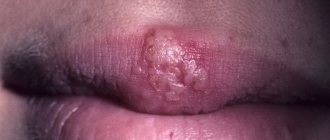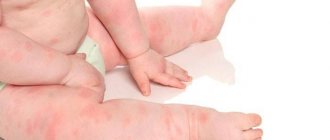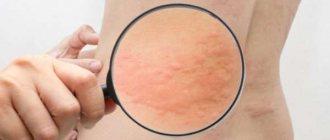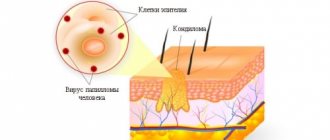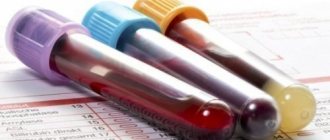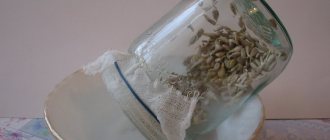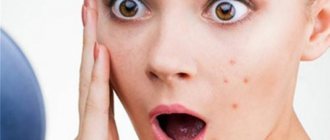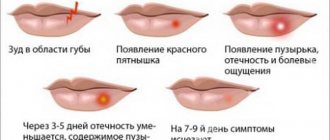What is urticaria
Urticaria is an allergic disease manifested by the formation of reddish blisters of varying sizes on the body. In addition to plaques, a person is bothered by severe itching; with chronic pathology, repeated relapses occur.
The disease is quite easy to treat if the main allergen is identified. The use of an antihistamine treatment regimen, the use of ointments and a number of other medications can quickly normalize the condition of the skin.
But pregnancy is a time characterized by hormonal changes in the body and a decrease in the functioning of the immune system, which is necessary for better consolidation of the fetus. It is these two factors that influence the fact that urticaria occurs more often in pregnant women.
An allergen that enters the body does not meet the proper “resistance” and an allergic reaction begins. The risk of blisters forming on the body is also increased in those expectant mothers who, before conception, have already experienced all the “delights” of allergic reactions.
How dangerous is urticaria for a pregnant woman?
Pregnancy is accompanied by significant changes in the body of the expectant mother. The skin often changes its appearance: a rash, itching, pimples, and acne appear. The cause of itching during pregnancy may be hives in the form of small red blisters on the body.
Hives in a pregnant woman can be triggered by taking medications, animal hair, cosmetics, plant pollen, internal diseases, and foods included in the menu. However, most often the development of the disease in the expectant mother is associated with changes in her hormonal levels that accompany pregnancy. During this period, a pregnant woman’s body produces a large amount of estrogens - sex hormones. This factor often becomes the cause of gestosis, a complex form of toxicosis, one of the manifestations of which is urticaria.
Symptoms of the disease
How does urticaria manifest during pregnancy? Main features:
- red spots on the body that have a convex, irregular shape, resembling blisters from a burn;
- pronounced itching;
- nervousness, irritability;
- insomnia.
Symptoms of urticaria (urticaria) in pregnant women are consistent. The spots first appear on the abdomen, then move to the thighs, buttocks, arms, chest and face. Such very noticeable signs irritate a woman, exciting her nervous system.
The signs of urticaria are very similar to ailments that can pose a threat to the normal development of a child: chicken pox, rubella, measles, etc. Therefore, it is extremely important to diagnose the disease in a timely manner and begin treatment.
Is there any effect on the fetus?
Hives are an allergy that is often passed on to the child. The disease itself is not dangerous for the baby, however, if left untreated, it can become chronic or even more serious - Quincke's edema. In this case, the developing disease poses a threat to both the fetus and the pregnant woman.
Treatment options
What to do if you get hives during pregnancy? First you need to see a doctor. You should not self-medicate, especially with regard to self-administration of antihistamines (diphenhydramine, terphenandine) - they can harm the baby and mother.
The occurrence of allergies is accompanied by intoxication of the body and decreased immunity. In order to stabilize the pregnant woman’s condition, the doctor prescribes special medications that allow the woman’s special situation to be tolerated.
- activated carbon, which helps eliminate toxins;
- hepatoprotectors to support the liver;
- vitamin complexes;
- prebiotics, bifidobacteria to normalize digestion;
- gels, ointments, water mash for external use.
If urticaria becomes severe, a woman may be prescribed hormonal medications (hormone ointments) or injections of glucocorticosteroids. In this case, the doctor approaches therapy during pregnancy with special caution.
Treatment, first of all, involves avoiding contact with the allergy trigger, which is determined using tests. If it is not detected, you should avoid contact with everything from the list of possible ones: follow a hypoallergenic diet, do not contact animals, do not use cosmetics.
Traditional medicine to help
Urticaria during pregnancy dictates its own rules of treatment; traditional medicine in this regard is the most favorable option. The first thing a woman suffering from urticaria needs to do is take a bath with a decoction of nettle and elderberry (in equal quantities) before going to bed.
Therapy can be continued with homemade ointment. To prepare it, finely chop the garlic (the head), pour in two glasses of boiling water and leave to simmer over low heat until half of the liquid has evaporated. Add a glass of olive oil (hot) and a little beeswax to the broth. After cooling, the ointment is applied to the urticaria spots.
To enhance the effect, take peppermint tincture during pregnancy. Pour 2 tablespoons of boiling water (350 g), cover with a lid and leave for at least an hour. Dosage of the product: 3 times a day, 50 ml.
What to do to avoid getting hives?
Pregnancy determines the diet, eliminating from the expectant mother’s menu everything that can harm the normal development of the fetus. To prevent urticaria, a woman should follow almost the same diet.
You should not rely on preserves, dyes and highly allergenic foods (oranges, strawberries, nuts, honey, coffee, seafood). But you need to drink a lot of water: at least 1.5 liters daily. Despite the many “don’ts” during pregnancy, the body must receive the required amount of minerals and vitamins.
Pregnancy is a heavy burden on a woman’s body throughout its entire duration. Therefore, if urticaria does not manifest itself in the first trimester, it is likely that it will appear in the second and even third. This suggests that preventive measures should be followed throughout pregnancy.
Causes and symptoms of the disease
As already mentioned, the main reason for the frequent occurrence of urticaria in pregnant women is a change in the ratio of hormones and a decrease in defenses. And allergens can be a variety of substances - food products, components of household chemicals and cosmetics, house dust, protein from animal saliva, pollen from various plants, and medications.
Pregnancy leaves its mark on the occurrence of allergic reactions. Urticaria most often manifests itself:
- the formation of blisters on the body - plaques raised above the skin, of different, most often irregular shapes and reddish color. Their sizes can be very minimal up to 2 mm, or gigantic - in some cases the spots reach 15 cm;
- severe itching;
- increased nervousness and irritability, which ultimately greatly disrupts sleep.
At first, several spots may appear on the body; with a mild form of the pathology, this is usually all that is limited to this, and after a while the rash along with the itching disappears. That is, such symptoms do not need to be eliminated with medication and therefore will not negatively affect the course of pregnancy.
In severe cases, blisters first form on the abdomen, then move to the buttocks and thighs, and begin to cover the surface of the arms, chest and face.
Chronic urticaria causes in pregnant women, in addition to the listed symptoms, a periodic increase in body temperature, headaches, and severe weakness.
With an acutely developing allergy, there is a danger of angioedema, manifested by swelling of the face, throat and an attack of suffocation. This condition requires immediate help.
Urticaria during pregnancy: how to treat it, photos describing the causes and symptoms
During pregnancy, a complete restructuring of the body occurs, the adaptation of all organs and systems to bearing a child.
Due to hormonal changes, mood swings and emotional disturbances are observed. Immune defense weakens, hidden diseases make themselves felt. Urticaria is a common occurrence during pregnancy. Urticaria in pregnant women is a skin disease that is predominantly allergic in nature and manifests itself in the form of a widespread itchy rash on the body.
Photo of 7 pieces of hives during pregnancy
Important
Urticaria during pregnancy does not pose a danger to the fetus. The baby is reliably protected by the placenta from the effects of allergens and external factors. Medicines that the expectant mother takes to treat hives can cause harm.
Symptoms of urticaria in pregnant women
The main symptom of the disease is flat or raised blisters, reminiscent of a nettle sting or mosquito bite. The blisters have an irregular round shape, surrounded along the entire perimeter by a bright pink or red edging.
The number of formations is constantly growing, they increase in size and merge.
Rashes appear, as a rule, spontaneously, on any one part of the body and gradually spread everywhere.
Images of the various manifestations of urticaria in pregnant women, shown in the photo, will allow you to quickly compare symptoms and begin treatment.
A big problem for the expectant mother is the constant companion of nettle rashes - itching. Problem areas itch unbearably, day and night. A woman cannot rest, get a full night's sleep, and becomes irritable.
With the protracted nature of the disease, a general deterioration of the condition may occur:
- temperature rises;
- nausea and vomiting are observed;
- headaches and dizziness occur;
- blood pressure drops.
In general, the prognosis for the outcome of the disease is favorable; over time, the symptoms will disappear without a trace. However, this may not happen soon. The acute phase usually lasts about 1 month, and the chronic phase up to a year.
Important
The most dangerous consequence of urticaria is anaphylactic shock and Quincke's edema. It is necessary to urgently call an ambulance if signs of swelling on the face, barking cough, hoarseness, or drop in blood pressure appear. Any delay can lead to death.
Find out more
Causes of urticaria in pregnant women
The causes of urticaria in pregnant women can be divided into the following groups:
- allergic;
- autoimmune;
- urticaria as a symptom of a concomitant internal disease.
Allergic reactions
Symptoms of urticaria occur under the influence of histamine, an activator of inflammatory processes. Histamine is found in special white blood cells (mast cells). By combining with the ingested allergen, histamine is released from mast cells and causes inflammation and rash on the skin.
This type of reaction is called immediate because the first symptoms can be noticed 30 minutes after contact with the allergen.
Types of urticaria that occur as an allergy:
Food. Allergens are food products. From insect bites. Substances provocateurs are poisons. Contact. The allergenic substance penetrates the skin.
For example, urticaria on the hands occurs upon contact with household chemicals, on the face - with creams and cosmetics.
Physical: photodermatosis (from the sun); aquagenic (from water contact with water); cold (from low temperatures); mechanical (from wearing tight clothing, friction, pressure).
Allergens do not enter the body directly. The process of histamine release is triggered by external factors.
Autoimmune reactions
In this case, urticaria occurs as a result of the circulation of antibodies that the immune system produces against its own cells. This is how serious diseases such as multiple sclerosis, type I diabetes mellitus, rheumatoid arthritis, and systemic lupus erythematosus begin.
Treatment of urticaria in pregnant women
Treatment of urticaria during pregnancy should be carried out under the supervision of a dermatologist or allergist. Only a doctor will be able to select therapy taking into account 2 most important principles: to alleviate the condition of the expectant mother and not to harm the developing fetus.
The treatment regimen for urticaria during pregnancy consists of solving several sequential tasks:
- determining the cause of the disease;
- exclusion of direct contact with disease provoking factors;
- symptomatic treatment;
- specific treatment of concomitant diseases and conditions.
Diagnosis of urticaria in pregnant women
Identifying the underlying cause of hives in pregnancy is critical to effective treatment. There are no specific methods for diagnosing urticaria. Clinical blood and urine tests will be uninformative.
They will show the presence of an allergic reaction in the body, but this is also visible visually. In order to distinguish one form of the disease from another, special diagnostic tests are sometimes used: allergy tests, provocation tests for the effects of cold, sun, and physical activity. But during pregnancy, all of them are prohibited.
Therefore, the diagnosis of skin rashes during pregnancy is made on the basis of a physical examination and medical history. The doctor evaluates the appearance and location of the rash, the severity of the condition, how long ago the symptoms began, and identifies possible influencing factors.
If the cause is determined correctly, treatment may not be needed at all. After eliminating contact with the allergen, the symptoms will disappear on their own and without a trace.
Drug treatment of urticaria in pregnant women
It is unacceptable to independently select medications for urticaria during pregnancy; only the doctor can decide what to treat.
Among the pharmacological agents for the treatment of urticaria in pregnant women, the following are used:
Sorbents. These are solids or liquids that are not digested and are excreted naturally. Passing through the digestive tract, they capture harmful substances (toxins, microbes, allergens) and cleanse the body.
In general, drugs in this group are harmless. But during pregnancy they should be taken only for indications, and not for prevention. After all, along with allergens, sorbents also remove useful substances necessary for the development of the fetus (vitamins, minerals, liquid). Antihistamines. The principle of action of these drugs is to block the production of histamine.
As a result, there is a softening or disappearance of the symptoms of urticaria: itching stops, swelling and inflammation subsides, and the formation of blisters stops. The doctor selects the correct combination of drugs in this group. Some of them may be ineffective, and some may be dangerous during pregnancy, especially in the first trimester.
Ointments and creams for topical use. Used for local application to specific areas of the body to reduce itching, burning and pain.
Traditional medicine
Traditional medicine recipes can be used in the treatment of urticaria in pregnant women only as an addition to traditional therapy.
To relieve itching and pain, decoctions of medicinal herbs are helpful: chamomile, calendula, string. Cotton pads soaked in the medicinal infusion are applied to the affected areas of the rash. If blisters are widespread, you can take baths with the addition of herbal decoctions.
To relieve swelling and inflammation, you can apply slices of cucumber, raw potatoes or cabbage leaves to the sore spot.
It is very important for the expectant mother to protect herself from worries and worries. Mint leaves are used as a sedative. They are added to tea or made into a tincture in boiling water.
Prevention of urticaria in pregnant women
During pregnancy, a woman is responsible not only for her own health, but also for the health of the unborn child. Taking medications and being in a stressful state will negatively affect the development of the fetus. The most basic precautions will protect you from such troubles as urticaria during pregnancy.
Preventive measures:
Watch your diet. Adhere to a special hypoallergenic diet. Give preference to home-cooked dishes and do not try unfamiliar products. Limit the use of cosmetics or buy them at the pharmacy.
Do not expose your skin to prolonged exposure to heat or cold. Do not sunbathe, do not swim in bodies of cold water, do not walk in frosty weather. For exposed areas of the body, use protective creams and ointments.
Wear loose clothing made from natural fabrics. Avoid physical activity, long walks, long trips. Visit your local doctor regularly. Get tested in a timely manner. Do not take medications without consulting your doctor.
Hypoallergenic diet
Poor nutrition during pregnancy is the main cause of hives. Following a special hypoallergenic diet will help avoid urticaria in both the expectant mother and the newborn during breastfeeding.
The main principle of such a diet is the exclusion from the diet of foods that increase the risk of allergies:
- eggs;
- poultry meat;
- Fish and seafood;
- citrus;
- nuts;
- red berries, fruits and vegetables;
- honey;
- chocolate;
- products containing histamine (sauerkraut, radish, radishes);
- sausages and sausage products;
- industrial sauces (mayonnaise, ketchup);
- products with dyes and food additives.
Source: https://www.dermatit.net/krapivnica/krapivnitsa-vo-vremya-beremennosti/
The danger of urticaria for the body of a woman and the fetus
The allergic reaction itself has virtually no negative effect on the development of the fetus. The only thing that increases after birth in a child is the tendency to allergies.
But you need to know that certain medications, their incorrect choice, dosage and duration of treatment can disrupt the formation of organs of a child developing in the womb. Therefore, for the prescription of antiallergic and other groups of drugs for urticaria, you should contact an experienced allergist.
The negative effect of allergic reactions on the body of a pregnant woman is also explained by the fact that such diseases, due to body itching and other manifestations, cause severe nervousness and disrupt sleep. Constant irritability and lack of sleep lead to psycho-emotional discomfort, which is not very good for both the expectant mother and her baby.
Growing angioedema also poses a threat. The suffocation that occurs with this complication without the use of special drug therapy can cause death.
It must be remembered that in pregnant women all pathological processes develop very quickly, and if the allergy begins to increase, then you need to immediately call an ambulance.
Features of the course of the disease in different trimesters of pregnancy
Most often, acute urticaria occurs in the first weeks after conception. This is due to the fact that at this time the immune system is most weakened and tries to adapt to an organism that is still foreign to it - the fetus.
The course of allergies is aggravated by the fact that it is in the first trimester that women most often experience severe toxicosis. Treating urticaria early should be the safest.
The urticaria that develops in the first weeks goes away or decreases by the beginning of the second trimester. But there is a danger of its becoming chronic, the exacerbation of which occurs with the slightest influence of the irritant.
In the last weeks of pregnancy, urticaria can be combined with gestosis, so it also cannot be ignored and treated independently.
How long does it take for signs of pregnancy to appear?
The initial signs of pregnancy appear in the second or third week after the end of menstruation, that is, about a week before the calendar start of the next menstruation.
Mucus discharge during pregnancy
Before the onset of menstruation, most women experience thick and scanty discharge called “leucorrhoea.”
After fertilization, due to the high level of progesterone, the work of the cervical glands, which produces mucus, is activated. Therefore, from the first days of conception, mucous discharge becomes more abundant, transparent and has a liquid consistency. It is this secret that protects the pregnant woman and the fetus directly from pathogenic microorganisms.
Thrush during pregnancy
The secretion secreted by the uterus is rich in hydrogen ions, so yeast easily multiplies in it, causing thrush, accompanied by white curdled discharge, itching and burning in the vaginal area.
Candidiasis during pregnancy can also develop against the background of a disturbance in the vaginal microflora.
To avoid intrauterine infection of the fetus, if signs of thrush appear, you should immediately consult a doctor.
Frequent urination during pregnancy
Often, increased frequency of urination is observed in late pregnancy, which is caused by the growth of the fetus in the womb and its pressure on the bladder and ureter.
But even in the first weeks of bearing a child, the urge to urinate may become more frequent, both during the day and at night, which is associated with increased blood circulation in the pelvic organs.
The expectant mother feels as if her bladder is full, and a small amount of urine is released during urination.
If frequent urination does not cause any discomfort, there is no need to worry about it.
Cystitis during pregnancy
Increased urination during pregnancy, accompanied by pain in the groin, burning in the ureter and increased temperature, may be a symptom of cystitis - a disease that often develops in the early stages of pregnancy due to a sharp decrease in immunity, increased susceptibility to bacteria and exacerbation of inflammatory processes.
Temperature 37 as a sign of pregnancy
An increase in body temperature to subfebrile levels (37.2 - 37.4 ° C) in the early stages of pregnancy in the absence of symptoms of viral diseases is normal in 8 cases out of 10. And it is explained by the increased production of progesterone, which affects the thermoregulation center, as well as physiological immunosuppression, which protects the body of a pregnant woman from rejection of the fetus.
A rise in temperature to 37.5°C should be a reason to visit a doctor.
Increase in basal temperature during pregnancy
This sign of pregnancy is informative only in the first 2 weeks after conception, after which the basal body temperature stabilizes.
Pregnancy is indicated by an increase in basal temperature for several days in a row to 37.0 - 37.2 ° C.
It is important to measure basal temperature correctly: the thermometer is inserted into the rectum immediately after waking up in the morning, without getting out of bed. It is recommended to carry out this procedure every day at the same time for several days.
Bloating (flatulence) during pregnancy
Starting from the early stages of pregnancy, intestinal motility is disrupted, which leads to increased gas formation and bloating.
Thus, already in the first weeks of conception, pregnant women may experience a feeling of excessive fullness in the abdomen, accompanied by a tingling sensation radiating to the uterus.
Constipation and diarrhea during pregnancy
Sex hormones produced during pregnancy inhibit the functioning of the intestines, causing it to relax, which causes constipation or, on the contrary, diarrhea. At the same time, constipation most often torments pregnant women in the later stages of pregnancy, while diarrhea is more typical in the first month of pregnancy.
Hemorrhoids during pregnancy
Frequent constipation and blood flow to the pelvic organs can provoke the formation of hemorrhoids, which mainly form in late pregnancy.
However, if before pregnancy a woman suffered from hemorrhoids, then this pathological condition often worsens in the first few weeks after conception.
Leg cramps during pregnancy
Cramps and pain in the legs often bother pregnant women at night. Cramps are manifested by involuntary sharp and painful contraction of the calf muscles.
To eliminate cramps, follow these recommendations:
- Stand on your flattened leg. If acute pain prevents you from moving your leg, you must, overcoming the pain, pull your foot towards you.
- Rub the cramped muscle using pinching and patting.
- Make a hot foot bath with salt.
Need for treatment
You cannot choose your own medications during pregnancy. First, you must first establish an accurate diagnosis. Secondly, the selected medications should not cross the placenta.
The only right decision is to contact an allergist; the doctor will prescribe tests, conduct an examination and select medications.
Mild forms of urticaria can be treated without the use of antihistamines. Sometimes an acute allergic reaction can be managed with topical medications and a number of other medications. The standard treatment regimen for urticaria includes:
- eliminating contact with the allergen. To do this, you need to identify the stimulus;
- taking enterosorbents - activated carbon, Polysorb. These medications remove toxins from the body;
- Taking antihistamines for a pregnant woman is a last resort. This can only be done as prescribed by a doctor. All antihistamines are somehow contraindicated during pregnancy. The most gentle options are Cetirizine (Cetrin, Zodak) and Levocetirizine (Xyzal, Suprastinex).
Features of treatment during pregnancy
Treatment of urticaria during pregnancy becomes more complicated. Many medications are prohibited to take, as they can have a detrimental effect on the baby. Sometimes it’s enough just to limit yourself to certain foods and remove all kinds of allergens. If this is not enough, traditional medicine comes to the rescue. In extreme cases, if the situation gets out of control and there is no improvement, it is advisable to use some medications.
Medications
How to treat urticaria during pregnancy? If it overtakes a woman at the beginning of pregnancy, then try to do without medications.
In general, corticosteroids and antiallergic drugs are prescribed for urticaria, but during pregnancy they are inappropriate and harmful. Only an experienced doctor can prescribe anything from this opera, after weighing all the pros and cons. Such treatment is permissible only from the second trimester of pregnancy and under the strict supervision of a specialist. The best option is topical use of antihistamines. An ointment is purchased and applied 1-2 times to the affected areas.
To relieve intoxication syndrome, you can drink enterosorbents:
- carbon tablets;
- Polysorb;
- Enterosgel, etc.
A pregnant woman should take them between meals, separately from other medications and vitamins. If this is done together, then the enterosorbent will remove all the beneficial substances from the body.
Vitamin complexes containing micro and macroelements are also desirable. The following will help restore intestinal microflora:
- Bifidobacteria;
- Probiotics.
Hepatoprotectors, such as Essentiale, are appropriate.
Natural remedies
The safest are folk remedies based on natural, herbal ingredients.
Here are some recipes to help cope with hives during pregnancy.
- Rubbing with salicylic alcohol or diphenhydramine solution will help relieve burning and itching from urticaria.
- A herbal decoction of herbs can calm and prevent an allergic reaction. You can take licorice root, pour boiling water over 30 g of raw material and leave. You should drink 100 g three times a day. The treatment should be completed when there is no trace of a rash left on the skin.
- A pregnant woman with hives can take baths containing a decoction of celandine or marjoram.
- It is advisable for a pregnant woman to drink a mixture of honey and horseradish juice every day. Prepares quickly. The proportions are 1 to 1. The dosage at one time is 5 ml.
- Mint tea wouldn't hurt. You can drink it twice a day.
- A decoction of stinging nettle helps with urticaria. For 35 g of raw materials you need about 250 ml of boiling water. You need to drink daily.
- Also a good option is an infusion of white mistletoe. The raw material is filled with cold water and left for a day (300 ml of water per 30 g of grass). It costs 25 grams to drink. once a day.
It is also very important for a pregnant woman to raise and strengthen her immune system during treatment for urticaria.
Diet
You won't be able to get rid of hives unless you stick to a diet. You need to avoid all allergenic foods. If you introduce something new to your diet, do it very carefully.
Particularly allergenic products are:
- pork and chicken meat;
- sausage products;
- crabs, mussels, crayfish, fish, etc.;
- canned food from stores;
- glazed cheese curds;
- milk;
- oranges, tangerines and lemons;
- bee products;
- tomato;
- blue;
- beet;
- sweets, especially those containing chocolate;
- persimmon;
- strawberries;
- nuts;
- egg;
- all made from wheat, etc.
Do not drink alcohol under any circumstances. Coffee is not recommended.
Give preference to this list:
- porridge (buckwheat, rice, millet);
- turkey or beef;
- baked apples, mostly green;
- lactic acid products (hard cheeses, low-fat cottage cheese, yogurt, kefir);
- yesterday's wholemeal bread;
- weak tea;
- herbal decoctions;
- compotes and fruit drinks.
This diet is indicated both during the treatment of urticaria and for its prevention, for pregnant and non-pregnant women.
Try to periodically cleanse your body of waste and toxins. To do this, drink enterosorbents. You can’t drink them all the time, as they will remove useful things from the body.
A pregnant woman needs to drink a sufficient amount of liquid per day - at least 1-1.5 liters.
How to relieve hives
It is possible to reduce the symptoms of urticaria in pregnant women using non-drug methods. A woman must refuse:
- from decorative cosmetics. It is advisable to use hypoallergenic detergents and creams;
- from frequent use of household chemicals;
- from using medications without a doctor’s permission. A number of medications either provoke an allergic reaction or make it worse;
- from some products.
Allergies in any of their manifestations are often caused by food products. A pregnant woman, from a very early stage, should give up a large amount of citrus fruits, fresh fruits with a red color, smoked foods, products with flavors and flavor enhancers.
If urticaria occurs, you should definitely adhere to a hypoallergenic diet, even if the allergen is not a food product.
If urticaria occurs, a pregnant woman should identify the allergen as early as possible and consult a doctor to prescribe a course of therapy. The sooner treatment is started, the higher the chances that the expectant mother will not be bothered by anything during the remaining period of waiting for the baby.
to the doctor on duty:
Hello! At 36 weeks of pregnancy, an allergy appeared, I can’t identify the allergen since I’m already pregnant, and even the simplest foods cause small spots all over my body. At first it all started from the stomach, and now it has completely covered all the arms and legs. This allergy is similar to hives, sleep is completely disturbed. How can this allergy be cured at this time?
Try Nezulin or La-Cri creams for the skin and enterosorbents orally between meals. But these are temporary measures, the reaction may intensify, you need to see a doctor.
To see new ones, press Ctrl+F5
Popular:
Free doctor consultation
A complete list (more than 150 items) with prices is updated regularly.
When should you go to see a doctor? We invite you to find out what nail fungus looks like at different stages.
Can it be cured in 1 day? Types, how to avoid infection, routes of transmission, medications.
Can it be cured in 1 day? Types, how to avoid infection, routes of transmission, medications.
How to remove warts yourself?
Warts in children, papillomas and condylomas in adults, what is the danger of removing them at home?
Thrush or vaginal candidiasis is known firsthand to every second woman.
Dermatitis: photo and description
It is possible that the spot on the skin is not a fungus at all. Compare the photos to make sure.
If there is a characteristic rash, then you need to run to the doctor, or at least to the pharmacy.
Representatives of the stronger half of humanity for some reason believe that thrush is the prerogative of women, but this is not so.
List of drugs for different types of fungus. Ointments, creams, varnishes, suppositories, tablets - comparisons, reviews, cost.
Test your knowledge of dermatology, whether you are a specialist or a student.
Urticaria in pregnant women
The occurrence of urticaria during pregnancy can lead to a deterioration in a woman’s emotional state. Carrying out quality treatment can help her normalize her general condition.
The term urticaria is a group of various diseases that have the same clinical symptom - skin rashes that appear in the form of blisters, which in appearance and structure resemble a burn that remains on the skin for some time after contact with nettles. The exact causes of this disease are quite difficult to identify and therefore difficult to completely cure. Skin rashes can appear for various reasons, and that is why a thorough examination of the patient and proper treatment are required.
Urticaria is considered a fairly common disease. According to statistics, more than 30% of people have experienced this disease at least once in their entire lives. Urticaria can occur at any age and regardless of gender. Urticaria in pregnant women is also quite common.
Causes
Urticaria has the main symptom of the appearance of blisters on the skin, accompanied by itching. After some time, redness of the skin may be observed around these formations, and the blisters themselves can merge with each other, thereby acquiring large sizes.
When pregnancy occurs, the female body begins to intensively produce estrogen, which contributes to the occurrence of hives. Also, urticaria during pregnancy can be triggered by some allergen (pollen, fur, dust, etc.) or some internal disease.
The cause of urticaria may be hidden in food products, which is why doctors recommend pregnant women a hypoallergenic diet that excludes various preservatives, food additives and salts from the diet. After all, even the most ordinary product that you ate every day before pregnancy can trigger the development of hives.
Doctor of Medical Sciences V.I. Dikul: “Penny product No. 1 for restoring normal blood supply to joints. Your back and joints will be the same as when you were 18 years old, just apply it once a day. " Read completely """
It is recommended to use cosmetics and household chemicals with caution during pregnancy and not to abuse medications. Urticaria, which appears during pregnancy, may signal the development of gestosis.
The main features of urticaria are severe itching of the skin, leading to scratching of the skin, irritability and insomnia. Chronic urticaria can provoke:
What to do if hives appear during pregnancy
During pregnancy, the female body undergoes various changes. For many, this is a period of pleasant experiences, but sometimes small trials arise.
One of them is urticaria, the likelihood of developing which increases significantly during pregnancy. Urticaria during pregnancy usually does not pose any threat to the baby, but it is important to pay attention to treatment in order to avoid complications and other consequences. Caution is also necessary when choosing the appropriate drug.
What is urticaria
Hives are an allergic reaction of a person to an irritant that causes increased production of histamine. The task of the hormone histamine is to raise alarm in the tissues and throughout the body.
Its increase is possible in cases where a real or hypothetical threat appears, for example in the form of a toxin or allergen.
Histamine rises and creates the necessary conditions for protection: it causes spasm, dilates capillaries, creates swelling, etc. When an infant comes into contact with an allergen, the hormone increases the permeability of the walls of blood vessels, resulting in the skin turning red, swelling and blisters.
During pregnancy, hormonal changes occur and immunity is significantly reduced, which increases the risk of developing hives. There are various reasons that can cause a negative reaction in the body in the form of corresponding symptoms.
How to relieve hives
Because treating hives with medications is highly undesirable, there are ways to relieve the condition in other ways. Expectant mothers are advised to follow several important recommendations:
- adhere to a hypoallergenic diet;
- limit contact with pets;
- buy cosmetics with a less aggressive composition, for example, pharmaceutical or children's ones;
- monitor your psycho-emotional state and avoid stressful situations;
- regularly carry out wet cleaning, using environmentally friendly products for washing and cleaning the house;
- spend as much time as possible under the scorching sun, especially without sunbathing;
- dress warmly in the winter season;
- If you are allergic to pollen or any plant, it is advisable to travel to places where there are none or as few as possible, if possible.
It is extremely important to adhere to a certain diet and exclude certain types of foods from your diet:
- canned food;
- smoked meats;
- seafood;
- chicken and pork;
- chocolate and other sweets;
- fruits: strawberries, persimmons, citrus fruits;
- eggs;
- nuts;
- honey;
- flour products;
- fast food;
- out-of-season fruits, vegetables and berries;
- coffee and sweet soda.
It is useful for mothers to include the following products in the menu:
- porridge: buckwheat, oatmeal, rice and millet;
- beef meat;
- fermented milk products, excluding milk;
- onion, dill;
- vegetables other than tomatoes, eggplants and beets;
- black or green tea.
It is necessary to drink enough water daily, as pregnant girls experience increased fluid loss.
Bottom line
Urticaria during pregnancy is not uncommon, as the female body gets used to the new condition and immunity decreases.
The condition causes significant discomfort and even panic for some, but the disease is almost always safe for the mother and unborn child.
In general, with proper treatment and compliance with preventive measures, urticaria will not cause harm. It is only important to monitor the general condition, not self-medicate and carefully select medications for treatment.
Source: https://syponline.ru/krapivnitsa-vo-vremya-beremennosti
Causes
A woman's body undergoes significant changes during pregnancy. The immune system has to work for two, which affects its ability to repel attacks from the outside.
Together with changes in hormonal balance, which can lead to disruption of digestive processes and metabolism, the immune system begins to react differently to external irritants and allergens.
Substances that previously did not affect the health of the expectant mother can cause various allergic reactions during pregnancy, one of which is urticaria.
The main reasons for the development of the disease are:
- production of the hormone estrogen, which causes a complex form of toxicosis to develop;
- food allergens - you need to be careful with your diet during the entire period of pregnancy;
- cosmetics and topical medications;
- household chemicals - washing powder, soap and shampoos;
- domestic animals and their fur;
- hay fever is the body’s reaction to seasonal flowering of plants and their pollen (house flowers can also be dangerous);
- urticaria can appear from cold (cold) or direct sunlight (solar);
- from insect bites and their poison;
- For non-allergic reasons, the development of the disease is facilitated by the presence of parasites in the body, disturbances in the functioning of the liver and thyroid gland.
Symptoms and signs
The clinical picture of the disease is typical for allergic urticaria and manifests itself as:
- skin redness and itching;
- rash and blisters, pruritic urticarial papules appear;
- Swelling of the face and limbs may occur.
Especially for pregnant women , the disease is accompanied by a general state of nervousness and irritability. Sleep disturbances are common.
External manifestations are localized on the abdomen, then spread to the thighs and buttocks, sometimes to the chest.
In the early stages, the disease rarely manifests itself, but can be caused by the fact that when a sperm penetrates the egg, the woman’s body perceives it as “foreign”.
Photos of symptoms
What does urticaria look like during pregnancy, look at the photo below:
Grandmothers' recipes
Recipes have been preserved with the help of which our grandmothers often cured urticaria during pregnancy. Here are some of these recipes:
- You can take baths before bed without harm to your health, adding nettle and elderberry decoction to them.
- A self-made garlic ointment with the addition of olive oil and beeswax helps a lot.
Recommended entries:
- Pimples on elbows
- Cellulite in children and adolescents
- Treatment of herpes on the body with medications
Diagnostics
When the first signs appear, you should immediately visit an allergist or dermatologist.
They will conduct a visual examination and interview the patient, on the basis of which it will be possible to judge the causes of the disease and its danger.
If this is not enough, a laboratory examination of blood (for antibodies and immunoglobulins) and urine (for the presence of parasites) will be prescribed.
Differential diagnosis may be necessary to distinguish urticaria from rubella or chickenpox, which pose a danger not only to the patient, but also to the unborn baby.
Establishing a correct diagnosis and the cause of the disease is necessary for its effective elimination. General tasks that a doctor faces when treating a patient are:
- find and eliminate potential allergens;
- improve the functioning of the digestive system and gastrointestinal tract;
- choose a suitable diet without allergens and with all the necessary vitamins.
Drug therapy
If eliminating contact with the allergen does not contribute to the patient’s recovery within 1-2 days, the doctor may prescribe medications.
Like any other allergic diseases, urticaria is treated with antihistamines . Due to the special situation, not every medicine is safe for the expectant mother, so you should definitely consult a doctor.
Approved drugs are:
- Fexofenadine. It acts quickly for any form of allergy; the dosage must be strictly observed.
- Levocytirizine. It is acceptable to use after the 2nd trimester.
- Desloratadine. The latest generation of antihistamines, immediate and long-lasting effect.
With severe angioedema or anaphylaxis, stronger drugs may be required, such as Suprastin, Claritin or Cetirizine.
Pregnant women are prohibited from taking antiallergic drugs in the first trimester, and at a later stage, they cannot use drugs such as: Ketotifen, Tavegil, Diphenhydramine and others.
First generation antihistamines are also prohibited, because proven to have a negative effect on fetal development .
To restore the function of the gastrointestinal tract and remove toxins and allergens, it is necessary to use drugs - sorbents :
They help protect the walls of the mucosa from repeated attacks of allergic compounds. However, sorbents can also remove useful substances. To restore them, the following are prescribed: Linex, Lactobacterin, Bifiform and others.
Additionally, hepaprotectors can be prescribed to support liver function , vitamin complexes, prebiotics and bifidobacteria to normalize digestive processes.
Ointments and creams
External preparations are also necessary for extensive damage to areas of the skin. They relieve itching , irritation, reduce blisters and redness.
Hormonal drugs are contraindicated during pregnancy.
You can smear damaged skin 2-3 times a day , which promotes its speedy regeneration. The following ointments and gels are recommended for use:
Read more about topical products in this article.
Folk remedies
The use of medications during pregnancy is not always possible and safe; many expectant mothers try to avoid these methods of therapy, caring for the health of the child.
There are more gentle traditional medicines. Although their effectiveness and safety are sometimes questioned by doctors.
Recommended course of treatment:
- As a first step towards recovery, it is recommended to wash yourself before going to bed in a bath with the addition of a decoction of nettle and elderberry . In a ratio of 1:1, a decoction of 2 spoons per 0.5 liters of liquid is poured into a filled bath. 10-20 minutes of such procedures every day is enough.
- The second step is to prepare a natural ointment . To do this, you need to simmer the head of garlic on fire with the addition of 2 glasses of water. When 2/3 of the liquid has evaporated, add a glass of olive oil and beeswax. The mixture should be allowed to cool, after which it can be applied to damaged areas of the skin.
- The third stage consists of drinking peppermint tincture . Pour boiling water (2 cups) over two tablespoons and let it brew for a couple of hours under the lid. Drink 50 mg 3 times a day. This will help you calm down and relieve irritability.
Traditional medicine should be used only after consultation with a doctor and cannot be used as the main method of treatment.
How to treat in pregnant women
The main requirement for treatment is safety for the baby, so folk remedies are used more widely than pharmaceutical drugs. Additionally, you can exclude foods that can cause allergies from your diet.
Drug therapy
To eliminate the allergen from the body, you can take an enterosorbent that will remove the toxin from the body - polysorb, activated carbon. Enterosorbents based on activated carbon or plant components have a gentle effect on the body. Cleansing enemas are also used.
To reduce skin irritation, you need to apply an ointment or cream with a soothing effect. In the first trimester it can be fenistil, in the second and third - psilobalm, elidel. The ointment is applied for 5–7 days in an amount of 4–5 times a day in a thin layer on the affected area of the skin.
Find out how to deal with allergies during pregnancy.
Physiotherapy helps reduce swelling and relieve pain. Ultraviolet radiation relieves pain and reduces the level of histamine in the blood, thereby eliminating the consequences of an allergic reaction. In severe and moderate forms, plasma purification or replacement with donor plasma is used to remove antibodies from the body.
Most antihistamines (diphenhydramine, claritin, tavegil, ketotifen, betadrine) are contraindicated in a pregnant woman. However, if symptoms are severe, the doctor prescribes antihistamines, monitoring the patient’s condition.
Under medical supervision you can use:
- cetirizine;
- fexophenidine.
The use of antihistamines is possible only if the risk from taking them is less than that to which the mother and baby are exposed without their use.
But in the early stages of pregnancy and in the last trimester, such treatment is strictly prohibited. Additionally, the doctor may prescribe:
- vitamins to support the immune system and prevention;
- liver support medications;
- probiotics to normalize digestive functions.
Find out whether pregnant women can take Suprastin for allergies.
Folk remedies
An alternative to the therapeutic course are traditional medicine. Their task is to reduce itching, rashes and swelling.
Recommended medicinal herbs for treating urticaria:
- nettle;
- series;
- chamomile;
- Oak bark;
- valerian root;
- peppermint;
- St. John's wort;
- sage.
To influence the entire surface of the skin, baths with medicinal herbs are used - chamomile, string, nettle.
They relieve inflammation of the skin. To prepare a therapeutic bath, a glass of dry raw materials must be diluted in a liter of water, boiled and allowed to brew for 0.5 hours. After this, it can be added to warm, but not hot water (the temperature should not be higher than 36°C), since hot water will increase the permeability of blood vessels and worsen the rash.
The duration of the procedure is 10–15 minutes. After the procedure, the body is wiped with a soft towel, and a medicinal ointment is applied to the affected area. It is recommended to repeat the procedure every other day.
Did you know? People with fair skin are more likely to experience hives than those with dark skin.
Infusions, decoctions, and extracts from medicinal raw materials are used internally. Dry or fresh raw materials are used for brewing. If the infusion is taken orally, the ratio of water to herbs should be 10:1.
For a decoction that will be used as a lotion, 1 tbsp. a spoonful of dry raw materials is poured with boiling water and infused, then used warm. Apply the lotion for 15 minutes. It can be used 2 times a day.
Diet
The diet takes into account 2 main parameters - water and drinking regimes. The daily water requirement is 2 liters. This will ensure that toxins and excess histamine are “washed out” from the body, thereby reducing intoxication.
Nutrition within 5 days after the appearance of urticaria should follow strict rules:
- Only dishes from zucchini, carrots, potatoes (boiled, steamed) are allowed;
- Use vegetables only pureed or chopped;
- take no more than 300 g of food at one time;
- the number of meals per day should be no more than 5;
- You can’t eat cold or hot food, everything should be warm or at room temperature.
Find out how to eat right and whether you can lose weight during pregnancy.
In the following days, new products are gradually introduced with an interval of 2 days between them. These will be:
- dairy products;
- porridge (oatmeal, buckwheat, rice);
- lean fish;
- lean meat;
- eggs;
- milk.
The sequence of introducing foods into the diet and the intervals between them must be strictly observed. This algorithm allows you to identify all problematic foods and eliminate them from the diet so as not to cause a relapse.
It is known that some foods are more allergenic. From the point of view of the likelihood of allergies, the same list of products is considered in reverse order.
Important! Onions, peppers, berries and parsley contain quercetin
, a chemically active substance that can reduce the histamine response. Fruits high in vitamin C can also reduce histamine levels in the blood.
Prevention
As a basic preventive measure against urticaria or during illness, it is necessary to adhere to a special hypoallergenic diet.
The food that contains the most active allergic substances is excluded from the diet. In particular, you should avoid chocolate and cocoa-containing foods, nuts, seafood, citrus fruits, strawberries and other red berries.
Read more about the diet for urticaria by following the link.
It is better to cook food yourself , because semi-finished and ready-made products in the store contain many additives, preservatives and dyes, which are strong allergens and are difficult for the body to digest.
The diet should be balanced and maintain the required amount of vitamins and minerals, and the number of meals should be increased to 5-7 per day . In addition, you need to drink 1.5 to 2.5 liters of fluid.
